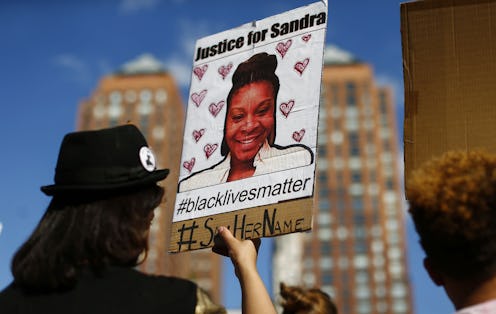News
What Sandra Bland Developments Could Be Next
Although a grand jury chose not to indict anyone last month for the death of 28-year-old Sandra Bland, who died in a Texas jail cell in July, the case isn't over just yet. Black Lives Matter activists protested Bland's death, ruled a suicide, as an example of unjust treatment of Americans of color by the police, as well as inadequate jail safety. Despite major drawbacks, the fight still continues, and there could be new developments in the Sandra Bland case in the next two years.
Three days after being arrested for allegedly not using a turn signal while driving and refusing to cooperate with the state trooper, Bland was found dead in her cell. Waller County officials said she hung herself with a plastic bag, but her family and activists didn't accept this explanation. According to Bland's sister, Sharon Cooper, she shouldn't have been in jail in the first place. "It's very clear that her civil rights were violated and that the officer acted in gross professional misconduct," Cooper told CNN in December.
On Wednesday, a Waller County grand jury met again to continue discussing the case, less than a month after deciding not to charge anyone with Bland's death. Special prosecutor Darrell Jordan told the Houston Chronicle the jury would be meeting in January to consider other matters in the case, but couldn't give specifics, as grand jury hearings are confidential.
The meeting shows that the grand jury wasn't only considering murder, but also other potential criminal charges. The jurors have yet to issue a decision about Department of Public Safety Trooper Brian Encinia's conduct while stopping and arresting Bland, so there's a possibility that he'll be charged with a more minor crime. For those seeking justice for her death, the continued hearings are good news — no one was indicted for murder, but there could still be charges brought against the arresting officer or Waller County Jail employees.
Additionally, Bland's mother, Geneva Reed-Veal, filed a wrongful death lawsuit against Encinia, two Waller County Jail guards, the Department of Public Safety, and Waller County itself. The federal lawsuit claims that Encinia fabricated a reason to arrest Bland and that the guards didn't respond adequately when she refused to eat and cried uncontrollably in jail. "We are looking for Waller County and the individuals involved in this situation to take accountability," Cannon Lambert Sr., the family's attorney, told The Washington Post after the lawsuit was filed. "This family is frustrated — they're frustrated because we don't feel like that has happened."
There's no timetable for when the grand jury will decide on all possible charges, and Reed-Veal's lawsuit is scheduled to go to trail in early 2017. So, it could be a while before any of these developments come to fruition.
